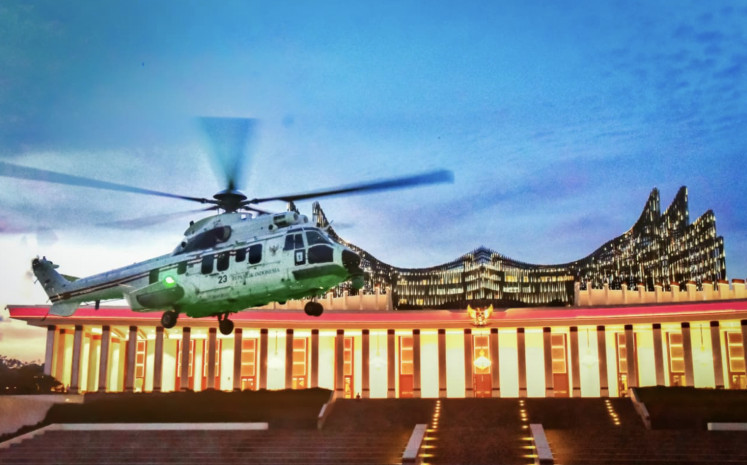Popular Reads
Top Results
Can't find what you're looking for?
View all search resultsPopular Reads
Top Results
Can't find what you're looking for?
View all search resultsLeo Suryadinata: Pushing the boundaries
Anyone studying the ethnic Chinese in Indonesia is bound to encounter Leo Suryadinata's works
Change text size
Gift Premium Articles
to Anyone
Anyone studying the ethnic Chinese in Indonesia is bound to encounter Leo Suryadinata's works.
While Leo has been internationally recognized for his contributions to exploring the multifaceted socio-cultural and political dimensions of the ethnic Chinese in Indonesia, he has also written extensively on many issues.
He has written on Sino-Indonesian relations, ethnic Chinese in Southeast Asia, nationhood and citizenship in Southeast Asia, as well as Indonesia's population and politics.
Fluent in Indonesian, English and Chinese, the prolific scholar has written 50 books and monographs in these languages.
During his 45-year academic career, he has also written close to 30 chapters in various books, 15 articles in international journals, 11 articles in regional journals, six working papers and more than 100 conference papers.
While examining the ethnic Chinese in Indonesia, for example, Leo investigates the interconnection between minority groups, ethnicity and nationhood.
This theme is evident in his first book, Peranakan Chinese Politics in Indonesia, his comprehensive Pribumi Indonesians, the Chinese Minority and China, based on his doctoral dissertation, and his latest work, Ethnic Chinese in Contemporary Indonesia, where he serves as an editor and contributor.
Leo explains in an email interview that both ethnic Chinese and non-ethnic Chinese can further contribute to the process of nationhood.
"First of all, it is important to understand conceptually that Chinese-Indonesians are an integral part of the Indonesian nation and this concept has to be socialized, especially by the pribumi Indonesians," he said.
"This is because 32 years of Soeharto rule had excluded the Chinese-Indonesians from the Indonesian nation. At the moment, the discussion of making John Lie as a Pahlawan Nasional Indonesia (Indonesian national hero) is also a right step in that direction, and I hope that John Lie will eventually become a Pahlawan Nasional.
"On the part of Chinese-Indonesians, they should also work harder to show that they are part of the Indonesian nation. "Again, nation-building is a long process; both sides have to be patient."
Born in Jakarta as Liauw Kian-Djoe (Liao Jianyu), Leo is the son of a factory owner dealing in tiles and other construction materials.
The only academic in a family of six boys and two girls, Leo had always been interested in Indonesian and Chinese literature and history.
He read and wrote numerous papers during his high school years, mainly on Indonesian and Chinese literature and history. He received his first degree, a Bachelor of Arts, from Nanyang University Singapore in 1962. His research interests were in Chinese and Southeast Asian history.
It was only after he returned to Indonesia to begin his Sarjana Sastra (a degree similar to a Bachelor of Arts) at the University of Indonesia (1962-1965), that he began to pay special attention to the ethnic Chinese in Indonesia.
This interest was sparked by a curiosity to learn more about the history of the Chinese in Indonesia, the country where he was born and brought up.
Leo wrote a sarjana (doctoral thesis) on the Peranakan Chinese press and pre-war Indonesian nationalist movements. Since then, he has continued to pursue his interests regarding the ethnic Chinese, not only involving Chinese-Indonesians, but also on the ethnic Chinese in Southeast Asia and beyond.
After he obtained his Sarjana Sastra from the University of Indonesia, Leo attained his Master's degree in history and politics from Monash University in Australia in 1970 and the University of Ohio, in the United States, in 1972.
Following the official approval of his doctorate from the American University at Washington D.C., Leo became a research officer at the Singapore-based Institute of Southeast Asian Studies (ISEAS) between 1976 and 1982.
Upon leaving this post as senior researcher at ISEAS in 1982, he was appointed senior lecturer at the Department of Political Science at the National University of Singapore (NUS).
He became an associate professor at NUS in 1994 before assuming the distinguished position as full professor at the university in 2000.
He then continued to be a senior research fellow at ISEAS from 2002-2005 before taking on his current position as the director of the Chinese Heritage Center at Nanyang Technological University in Singapore.
Although his formal academic positions have been in Singapore, Leo, father to a daughter, returns often to Indonesia to conduct research and to present papers at seminars and conferences.
This month, Leo is in Jakarta to receive the Nabil Award 2008 for his contribution to the process of nation-building in Indonesia.
The Nabil Award, established by Eddie Lembong in 2006, is given annually by the Nabil Foundation an was first given to Claudine Salmon, a French researcher, in 2007.
Leo is also steadfast in his conviction that "the future of Chinese-Indonesians is with Indonesia".
"Chinese-Indonesians are not a homogeneous group. It is very difficult to make generalizations. But for the majority of Chinese-Indonesians, they do not have other choices but to continue to live in Indonesia and identify themselves with the young nation."










